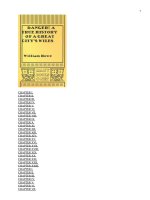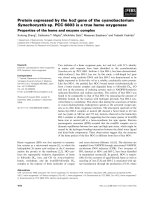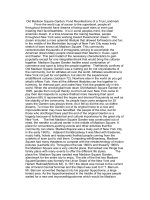Eichenwald conspiracy of fools; a true story (2005)
Bạn đang xem bản rút gọn của tài liệu. Xem và tải ngay bản đầy đủ của tài liệu tại đây (3 MB, 670 trang )
ALSO BY KURT EICHENWALD
THE INFORMANT
SERPENT ON THE ROCK
CONSPIRACY OF FOOLS. Copyright © 2005 by Kurt Eichenwald. All rights reserved. No part of this book may be
reproduced or transmitted in any form or by any means, electronic or mechanical, including photocopying, recording, or
by any information storage and retrieval system, without written permission from the publisher. For information, address
Broadway Books, a division of Random House, Inc.
BROADWAY BOOKS and its logo, a letter B bisected on the diagonal, are trademarks of Random House, Inc.
Visit our website at www.broadwaybooks.com
First edition published 2005.
Library of Congress Cataloging-in-Publication Data
Eichenwald, Kurt, 1961–
Conspiracy of fools : a true story / Kurt Eichenwald.—1st ed.
p. cm.
1. Enron Corp.—Corrupt practices. 2. Energy industries—Corrupt practices—United States. 3. Lay, Kenneth L. 4.
Business failures—United States. I. Title.
HD9502.U54E5736 2005
333.79′0973—dc22 2004058216
eISBN: 978-0-7679-1180-1
v3.1
To my parents,
Elva Eichenwald and Heinz Eichenwald,
Who encouraged me to fight my windmills
And cheered me when I won.
Contents
Cover
Other Books by This Author
Title Page
Copyright
Dedication
Epigraph
Author’s Note
Prologue
Book One - The Wine of Aspiration
Chapter
Chapter
Chapter
Chapter
Chapter
1
2
3
4
5
Book Two - Raptors
Chapter
Chapter
Chapter
Chapter
Chapter
Chapter
Chapter
Chapter
6
7
8
9
10
11
12
13
Book Three - The Probability of Ruin
Chapter
Chapter
Chapter
Chapter
Chapter
14
15
16
17
18
Book Four - Shattered
Chapter 19
Chapter
Chapter
Chapter
Chapter
20
21
22
23
Epilogue
Acknowledgments
Notes and Sources
Reason dreams of an empire of knowledge, a mansion of the mind. Yet sometimes we
end up living in a hovel by its side.
—Heinz R. Pagels, The Dreams of Reason
If I remember, I predicted fence integrity would fail.
—The character of Ian Malcolm,
in Michael Crichton’s Jurassic Park
AUTHOR’S NOTE
This narrative account is based on more than a thousand hours of interviews with over a
hundred participants in these events as well as a review of tens of thousands of
con dential corporate and government documents. Those include FBI notes of
interviews and testimony before federal grand juries, the SEC, and other federal bodies.
The dialogue comes from those documents and contemporaneous records—including
personal diaries—or from the best recollections of participants. This, then, is the full
story of America’s biggest corporate scandal, one that, in the end, involved events that
even now may seem difficult to believe. But they’re all real.
THE CAST OF CHARACTERS
and Their Primary Roles
WITH THE ENRON CORPORATION, HOUSTON, TEXAS
The Top Officers
Kenneth Lay, chairman and CEO
Jeffrey Skilling, president (1997–2001), CEO (2001)
Rich Kinder, president (1989–1996)
Greg Whalley, president (2001)
In the Finance Division
Andrew Fastow, chief financial officer (1998–2001)
Michael Kopper, head of special projects
Jeffrey McMahon, treasurer (1999–2000), CFO (2001–2002)
Ben Glisan Jr., treasurer (2000–2001)
Raymond Bowen Jr., treasurer (2001–2002)
Jordan Mintz, general counsel
Lea Fastow, assistant treasurer
Michael Jakubik, vice president
Jim Timmins, director, private equity
Tim Despain, vice president
Bill Brown, vice president
The Internal Accountants
Richard Causey, chief accounting officer
David Woytek, vice president, corporate auditing
Rodney Faldyn, vice president, transaction accounting group
Ryan Siurek, member, transaction accounting group
In Risk Assessment
Richard Buy, chief risk officer
Vince Kaminski, vice president of research
Stinson Gibner, analyst
Vasant Shanbhogue, analyst
Rakesh Bharati, analyst
Kevin Kindall, analyst
In Corporate Development
J. Clifford Baxter, executive vice president
Mark Muller, senior vice president
Sherron Watkins, vice president (2001)
The Corporate Staff
Rebecca Carter, investor relations representative, corporate secretary
Mark Palmer, head of corporate communications
Stephen Kean, head of government affairs (1998), chief of staff (1999–2001)
Mark Koenig, head of investor relations
Cindy Olson, head of community relations
In the Legal Department
James Derrick, general counsel
Rob Walls, deputy general counsel
Rex Rogers, associate general counsel
In Wholesale Energy
Kenneth Rice, chief executive
Kevin Hannon, president
Greg Whalley, president (2000)
Amanda Martin, managing director, asset management
Mark Haedicke, general counsel
Kristina Mordaunt, co-head of finance legal cluster (1997–1999)
Timothy Belden, managing director, west power trading division
John Forney, manager, west power real time trading desk
Stuart Zisman, senior counsel
Mark Frevert, president, London (1998), unit chairman (2000–2001)
In Retail Energy
Andrew Fastow, managing director (1996)
Lou Pai, chief executive (1996–2001)
David Delainey, chief executive (2001)
Raymond Bowen Jr., vice president
In the International Division
Rebecca Mark, chief executive
Joseph Sutton, deputy
In the Broadband Division
Kenneth Rice, co-chief executive (1999), chief commercial officer (2000)
Joseph Hirko, co-chief executive
Kevin Hannon, chief operating officer
Rex Shelby, senior vice president
Kristina Mordaunt, general counsel (1999–2001)
At Portland General, an Electric Utility
Kenneth Harrison, chairman
Joseph Hirko, chief financial officer (1991–1996)
At Azurix, a Water Company
Rebecca Mark, chief executive
Amanda Martin, executive director
Colin Skellett, executive director
On the Board of Directors
John Duncan
Herbert “Pug” Winokur Jr.
Norman Blake
Charles “Mickey” LeMaistre
Robert Jaedicke
Robert Belfer
Wendy Gramm
William Powers
WITH ARTHUR ANDERSEN & CO.
Joseph Berardino, managing partner (2001–2002)
Andrew Pincus, general counsel
John Riley, practice director
Rich Corgel, practice director
In the Houston Office
David Duncan, partner
Stephen Goddard, partner
Thomas Bauer, partner
Carl Bass, partner
Debra Cash, partner
Patricia Grutzmacher, partner
Gary Goolsby, global managing partner
James Hecker, partner
In the Professional Standards Group, Chicago, Illinois
John Stewart, partner
Ben Neuhausen, partner
In the litigation group, Chicago, Illinois
Nancy Temple, lawyer
WITH DYNEGY CORPORATION, HOUSTON, TEXAS
Chuck Watson, chairman and chief executive
Stephen Bergstrom, president
Keith Fullenweider, deputy general counsel
Rob Doty, chief financial officer
WITH MERRILL LYNCH & COMPANY
Daniel Bayly, head of global investment banking
James Brown, head of strategic asset lease and finance
Schuyler Tilney, relationship banker, Houston office
Robert Furst, relationship banker, Dallas office
John Olson, securities analyst
WITH GREENWICH NATWEST, GREENWICH, CONNECTICUT, AND LONDON,
ENGLAND
Gary Mulgrew, managing director
Giles Darby, managing director
David Bermingham, banker
WITH J. P. MORGAN CHASE
James (Jimmy) Lee, vice chairman
Rick Walker, relationship banker
WITH KYNIKOS ASSOCIATES
James Chanos, president
THE OTHER CHIEF EXECUTIVES
Dennis Kozlowski, Tyco International
Rupert Murdoch, News Corporation
Sumner Redstone, Viacom
WITH THE LAW FIRMS
At Vinson & Elkins, Houston, Texas
Joseph Dilg, managing partner
Ronald Astin, partner
Max Hendrick III, partner
At Wilmer, Cutler & Pickering, Washington, D.C.
William McLucas, partner
Charles Davidow, partner
Joseph Brenner, partner
William Joor, partner
Reed Brodsky, counsel
At Weil, Gotshal & Manges, New York City
Thomas Roberts, partner
Mary Korby, partner
THE PRESIDENTS
George H.W. Bush (1988–1992)
Bill Clinton (1992–2001)
George W Bush (2001–2004)
AT THE WHITE HOUSE OF GEORGE W. BUSH, WASHINGTON, D.C.
Dick Cheney, Vice President
Andrew Card, Chief of Staff
AT THE UNITED STATES DEPARTMENT OF JUSTICE, WASHINGTON, D.C.
John Ashcroft, Attorney General
Larry Thompson, Deputy Attorney General
Michael Chertoff, head of the criminal division
On the Enron Task Force
Leslie Caldwell, director
Andrew Weissmann, deputy director
With the Federal Bureau of Investigation
Robert Mueller, director
Joseph Ford, special agent
AT THE SECURITIES AND EXCHANGE COMMISSION, WASHINGTON, D.C.
Arthur Levitt, chairman (1993–2001)
Harvey Pitt, chairman (2001–2003)
Richard Walker, director of enforcement (1998–2001)
Stephen Cutler, director of enforcement (2001–2004)
Linda Chatman Thomsen, deputy director of enforcement
In the Fort Worth Regional Office
Spencer Barasch, associate district administrator
Robert Hannan, lawyer
AT THE UNITED STATES DEPARTMENT OF THE TREASURY, WASHINGTON, D.C.
Lawrence Summers, Secretary (1999–2001)
Paul O’Neill, Secretary (2001–2002)
AT THE UNITED STATES DEPARTMENT OF COMMERCE, WASHINGTON, D.C.
Donald Evans, Secretary
AT THE UNITED STATES DEPARTMENT OF STATE, WASHINGTON, D.C.
Colin Powell, Secretary
IN CALIFORNIA STATE GOVERNMENT, SACRAMENTO, CALIFORNIA
Gray Davis, Governor
IN THE UNITED STATES CONGRESS
In the Senate
Trent Lott, Majority Leader, Republican of Mississippi
Phil Gramm, Republican of Texas
In the House of Representatives
W J. (Billy) Tauzin, Republican of Louisiana
James Greenwood, Republican of Pennsylvania
Staff, House Energy and Commerce Committee’s Subcommittee on Oversight and
Investigations
Mark Paoletta
David Cavicke
Ken Johnson
AT THE WALL STREET JOURNAL
Jonathan Weil, reporter
John Emshwiller, reporter
Rebecca Smith, reporter
AT FORTUNE MAGAZINE
Bethany McLean, reporter
OTHERS
Bal Thackeray, leader, Shiv Sena, Mumbai, India
Arnold Schwarzenegger, actor, Los Angeles, California
THE PRIMARY DEALS
JEDI
Joint Energy Development Investments. A fund—jointly owned by Enron and the
California Public Employees Retirement System, or Calpers—to invest in oil and gas
properties.
JEDI II
Also formed between Enron and Calpers, for investments in a wider range of assets.
CHEWCO
An o -books partnership controlled by an Enron executive. Used to purchase Calpers’s
interest in JEDI to allow for the retirement system to invest in JEDI II.
LJM CAYMAN
Also known as LJM1. An investment fund managed by Enron’s chief nancial o cer.
Used mainly to provide Enron with a protection against a decline in the price of its
investment in a technology company, Rhythms NetConnections.
LJM2
A far larger investment fund, also managed by Enron’s CFO. Used primarily to purchase
investments and assets that Enron wanted to sell, and to provide cash to o -books
entities that were also doing deals with the company.
THE RAPTORS
A quartet of o -books entities which were, at one point, partly owned by LJM2. They
were created for the purpose of providing Enron with a protection against losses from
certain investments in other companies and assets.
BRAVEHEART
The code name for a deal involving the sale by Enron of a portion of its video-on-
demand business, formed in a joint venture with Blockbuster. Again, the sale was to an
off-books entity created by the company.
PROLOGUE
OCTOBER 24, 2001—HOUSTON, TEXAS
Ken Lay settled into his black Mercedes 600 SL, easing out of his reserved parking space
at the Huntingdon condominiums. From the lot’s entrance, he turned right onto Kirby
Drive, the tree-lined road that served as a main thoroughfare through River Oaks,
Houston’s wealthiest and most prestigious neighborhood.
The eight-year-old convertible cruised past the mansions bordering the street, homes
that testi ed to the nancial success of the city’s oilmen and corporate barons. Many
estates peeked out from behind manicured shrubs and wrought-iron gates, or were far
from the road on a ridge sloping down to the Bu alo Bayou. But Lay made no e ort to
peer beyond those veils of privacy. As Houston’s most in uential businessman, he had
already been welcomed in most every River Oaks mansion that might interest him.
The neighborhood’s elegance melted into Allen Parkway, a winding stretch of road
that o ered the most direct route downtown. Ahead, the morning sun was a blazing
orange ball, rising behind a glittering glass-and-aluminum tower that de ned the
architectural rhythm of Houston’s skyline. It was the headquarters of Enron—his Enron
—the once-obscure pipeline company that in a matter of years had been transformed
into a politically connected energy colossus. Enron was now at the epicenter of
Houston’s life, a ubiquitous player in everything from the city’s politics to its sports
teams. But for locals, the sprawling giant would probably just always be known as Ken
Lay’s company.
Lay lowered his car visor and glanced at the dashboard clock. Shortly before seven,
early for his commute. But already he knew this would not be a normal day. His
company was under attack; Lay was sure of it. Stock traders who had bet that Enron’s
share price would fall were whispering rumors—no, lies—about his company. The Wall
Street Journal was publishing a drumbeat of articles suggesting Enron had played games
with its finances. It infuriated him.
They just don’t understand.
By all rights, Lay shouldn’t even have been stuck with the mess. He had stepped down
as chief executive the prior February, handing the reins to his handpicked successor,
Je rey Skilling, the brains behind Enron’s spectacular growth. With market power came
world in uence, and—as Skilling’s pro t machine rumbled along—Lay had emerged as
a confidant of presidents, a media celebrity, and, at least in Houston, a household name.
When Lay bowed out, he was celebrated as a man of vision who got things done. By
year’s end, he was supposed to be ensconced in a new job at Kohlberg Kravis Roberts &
Company, the buyout firm, basking in the glory of the empire he had left behind.
Then, with almost no warning, Skilling had up and resigned. Just like that, only
months after winning the job. Lay had suspected for weeks that something was wrong
with his successor; he had even quietly told a few Enron directors that Skilling seemed
emotionally overwhelmed by his new responsibilities. Still, he had never imagined the
man would just leave. The bombshell had left Lay with little choice. He contacted KKR’s
principals, passing up their offer, and headed back to his old post.
But nothing was the same. Inside Enron, Skilling’s departure unleashed a torrent of
anger and demands for change; outside, it fanned suspicions that there were some
terrible secrets harbored within the company.
Rapidly, the press had lit into the company’s chief nancial o cer, Andrew Fastow,
criticizing him for holding a second job as manager of investment funds that did deals
with Enron. The allegations of a con ict of interest angered Lay; he had listened to
Fastow reluctantly take on the additional responsibilities, just to bene t the company.
And it had. The Fastow funds provided partners that knew Enron’s business, that could
transact deals quickly. As far as Lay was concerned, Fastow had gone the extra mile for
Enron and now was getting tarred for his loyalty.
We had every protection in place. We disclosed it all. They just don’t understand. Lay
turned in to the Allen Center Garage, parking one space from the walkway to the Enron
building. He hurried to the company’s sleek metallic lobby, approaching a security
checkpoint installed after the September 11 attacks. Holding up a magnetic card, he
hesitated until the green light flashed, and then pushed past to the elevator.
The huge, mahogany-paneled reception area on the ftieth oor was quiet and
empty. Lay strode through, past a multicolored statue of an elephant colleagues had
acquired on one of their many trips to India. Using a card key, he released an electronic
lock and pushed open the heavy wooden door to the executive o ces. He saw Rosalee
Fleming, his assistant, busy at her desk.
“Morning, Rosie,” Lay said.
“Good morning, Ken. Andy Fastow called a few minutes ago. He said that he needs to
meet with you urgently.”
“All right. Let him know I’m here.”
Lay slipped o his suit jacket as he walked into his o ce. He pressed a panel in the
wall, popping open a hidden closet, where he hung the jacket. Lay pulled out his chair,
but before he could sit, Fastow appeared in the doorway.
“Good morning, Andy,” Lay said. Fastow nodded. “We need to talk, Ken.”
“Well, come in. Sit down.”
Fastow shu ed toward a circular conference table bolted to the o ce oor. Lay
reached inside his desk drawer and touched a button, sending a radio signal across the
room to a release in the door. It shut automatically.
As Lay took his seat, he glanced across the table. Fastow looked awful, showing the
strains of the last few days. Usually, he was neatly coi ed, everything about him fresh
and tailored. But today his face sagged, his brow furrowed. He looked as if he hadn’t
slept most of the night.
“I’ve got some information I need to share with you,” Fastow said. “Last night Ben
Glisan met with some of the bankers, and they told him that they couldn’t proceed with
a loan to us so long as I was chief financial officer.”
That was grim news. Glisan, Enron’s young treasurer, was a devotee of Fastow. If he
couldn’t persuade the bankers to do business with the man, no one could.
It was a di cult moment. Lay had been ghting for days to keep Fastow in his job,
fending o e orts by the company’s new president, Greg Whalley, to oust him. Lay
respected Fastow, and the board almost revered him; he couldn’t just re his CFO
because of a few nasty newspaper articles. But this was di erent. If bankers wouldn’t do
business with him, Enron itself was in peril.
“You know, Andy, we talked about this possibility,” Lay said. “Certainly the board
and I have been very supportive of you, both publicly and privately. But we’ve also said
that if you ever lost the con dence of the nancial community, we would have to
rethink the whole thing.”
Fastow nodded, his eyes downcast.
“So I need to call a board meeting and see what they think we ought to do,” Lay said.
“I’ll do that as soon as I can, because, obviously, we’ve got a lot going on.”
Fastow was silent. “Well,” he said nally, standing as he spoke, “thank you for
meeting with me, Ken.”
It pained Lay to watch Fastow trudge out of the room, back to a desk they both knew
he would soon be vacating. Lay was certain that in no time, the squall about Enron
would pass, but by then, it would be too late to save the career of this talented young
executive. Fastow would be a victim. It just wasn’t right.
Lay had no idea that Fastow had failed to tell him the most devastating news of all—
news he wouldn’t learn for years to come.
At almost that very moment across town, Ray Bowen was standing naked in his upstairs
bathroom, checking the shower temperature with his hand. As he lifted his foot to step
inside, the telephone rang. In the bedroom, his wife answered the line and put the call
on hold. “Hey, Ray!” she called. “It’s Jeff!”
This couldn’t be good, not at this hour. His boss, Je McMahon, head of Enron’s
paper-market business, would only call this early with a problem. And Bowen knew
Enron’s recent chaos had created plenty of those. Wrapping a towel around his waist, he
stepped into a toilet room where he had installed a Panasonic phone system.
“Hey, Jeff. What’s up?”
“It’s bad, man,” McMahon said. “The shit really hit the fan last night.”
Bowen listened in disbelief as McMahon told the ugly story. Enron had reached the
precipice of collapse. The markets for the billions of dollars in day-to-day credit that
large companies need—to pay salaries, to meet obligations to vendors, to keep the lights
on—had shut out Enron. The institutions that ponied up the cash in short-term loans
known as commercial paper no longer believed the company was worth the risk. The
marketplace—that living, breathing entity whose judgment its executives hailed as
infallible—was passing its harsh, unemotional verdict: Enron could not be trusted to
survive the week.
“How … how can that be?” Bowen stuttered.
“Don’t know, but that’s what I’m hearing.”
McMahon paused. “I think that’s it,” he said. “I think they’re going to re Andy
today.”
No kidding. Fastow had so mismanaged the books that nobody trusted Enron with an
overnight loan? Of course he was gone. And if Lay let sentimentality get in the way of
that obvious decision, then Whalley would pull the trigger.
“So what’s the plan?” Bowen asked.
“I need your help. Whalley wants you and me to come in and help him gure it out.
Can you be there by eight?”
Fifty- ve minutes later, McMahon was in the o ces of his division on the fourth oor
of Enron’s new building when he saw Bowen hurrying toward him.
“What do you think?” McMahon called out.
“We’ve gotta draw down the revolvers right away,” Bowen replied brusquely.
The revolvers. The billions of dollars in standing lines of credit that Enron had
available from its major banks. That was disaster money, the nancial equivalent of a
nuclear fallout shelter. And Enron needed it now.
The two men hustled to the ftieth oor of the main Enron building. They headed to
Skilling’s old o ce, where Whalley had recently set up shop. A few others were already
gathered there. Whalley’s door was closed, and his secretary told the men they needed to
wait.
“Greg’s meeting with Andy Fastow,” she said.
Minutes passed. Finally the doorknob clicked and Fastow emerged, ashing a nervous
smile. Whalley pushed past and took command.
“Okay,” he said. “We’re meeting upstairs. Go on up, and I’ll be there in a few
minutes.”
The men rode a small internal elevator to the mezzanine level and made their way to
a tiny conference room, crowding around an oblong table. Fastow and McMahon—who
had long treated each other with an antipathy bordering on contempt—drifted to the
seats farthest away from each other. Fifteen minutes later, Whalley blew into the room.
“Okay, let’s get going,” he said as he took his seat. “Let’s start with the organization
first.”
Whalley shot a look at Fastow, pointing at him.
“Andy,” he said rapidly, “as we discussed, you’re no longer CFO, effective right now.”
Fastow’s face fell. “Wait …”
Ignoring Fastow, Whalley swept his arm across the table, pointing at McMahon.
“Jeff, you’re now CFO of this company.”
What was that? McMahon wasn’t sure he heard Whalley correctly. He was chief
financial officer? Just like that?
“Excuse me?” McMahon said. “I’m CFO?”
“Yes, you’re CFO.”
McMahon glanced across the table. Fastow was shaking his head, looking shocked.
The moment was surreal.
Are other companies like this? You get promoted and the guy you replace gets red, all in
front of everybody?
“Wait a minute!” Fastow sputtered, anger in his voice. “That was not my
understanding of the deal!”
Whalley held up a hand. “Andy, I don’t have time for this. I don’t know your
arrangement; I don’t know the legal stu . You get with Ken and work it out. But you’re
not CFO. That decision’s made.”
That was it. Whalley turned away from Fastow.
“Okay, Jeff, commercial paper. What should we do?”
“Well,” McMahon said, “I need to assemble a team to gure out where we are. But I
think there’s a good chance we’ll need to draw down the revolvers.”
Bowen jumped in. “People, from my experience, if a company has a cash crisis, it
either draws its revolvers immediately or gets ready for the banks to come in and nd
lots of reasons to delay sending the cash.”
The group tossed around the idea. Fastow shook his head, leaning forward in his
chair. “Wait a minute, Ray,” he said, looking at Bowen. “I really disagree with you. I
think drawing down the revolvers will send a terrible message to the market.”
Fastow pressed a forefinger against the table.
“You do this,” he said forcefully, “and people are going to think there’s really
something wrong at Enron.”
Three hours later, Fastow sat in a rich leather chair at the credenza behind his desk,
typing an e-mail to his wife, Lea. They had planned to have lunch together that day, but
now that was impossible. Too much needed to be done; he had to get some things
settled. He finished typing his apologies to Lea and hit the “send” button.
Fastow pushed back from the credenza and stood. Ken Lay appeared in his o ce
doorway, his face stern.
“I need to talk to you, Andy,” Lay said.
“Okay, Ken. Come on in.”
Fastow touched the button on his remote, closing his o ce door, while Lay sat at the
conference table. As Fastow joined him, Lay eyed the man he had trusted for so long. In
the hours since their rst meeting that day, he had learned new information, disturbing
details that had made Lay question his steadfast con dence in Fastow. But no matter.
The problem was out of Lay’s hands now.
“Andy, I just left a meeting of the board. And based on the information you provided
this morning, the board decided that we can’t continue with you as CFO. We’ve decided
to put you on a leave of absence and make Je McMahon the new chief nancial
officer.”
Fastow didn’t inch. Lay was surprised; no one had bothered to tell him that Whalley
had already delivered the news with far less formality. “I understand,” he said.
Before Lay could speak again, Fastow plowed ahead.
“We need to work out a severance agreement,” he said.
Lay shook his head. “We’re not ready for that, Andy.”
“It won’t take long. I won’t be unrealistic. I know I’m entitled to nine or ten million
dollars. But I think for three or four million, we can all agree that I’m leaving and I’m
not going to be a problem.”
What? Was this some kind of threat?
“Andy, we’re not doing it that way,” Lay said. “First of all, there’s a lot I need to do
other than negotiate your severance. But I also need the board involved.”
Fastow leaned in, his voice above a whisper. “Well, let’s just have a handshake on
something now, you and me, just so it’s done.” Lay almost recoiled in disgust.
“No, Andy. We’ll talk about it in a few days, but right now we’re not going to do
anything.”
Lay didn’t wait for a response. He rose to let Fastow know that the meeting had
ended.
“Andy, I think the sooner you exit the building, the better,” he said. “I’m sorry about
what’s happened, but it’s necessary. Obviously, I wish you and Lea the best.”
Lay strode out of the room, con dent he had done the right thing. With Fastow going,
he felt a tinge of hope that Enron would soon right itself. Still, the news he had learned
at that day’s board meeting, coupled with Fastow’s sordid scheming for a secret
severance, left him shaken.
Had his chief nancial o cer, a man he had trusted implicitly, really been a snake all
along?
OCTOBER 27, 2001—MIAMI BEACH, FLORIDA
The jazz guitarist shu ed toward the front of the small stage at the Jazid club, easing
into a sensual blues solo. The bar was woody and intimate, illuminated by longstemmed candles resting on a handful of marble-topped tables. On this night the place
was packed, the crowd swaying to the rhythm of each soulful riff.
On one side of the room Je Skilling sat at a crowded table, downing a glass of white
wine. None of the revelers spoke to him; none seemed to recognize him as someone
who, weeks before, had been CEO of one of America’s top companies. And none realized
that on this night, he was deteriorating, a man approaching a nervous breakdown.
There’s no way out of this.
Skilling ran it through his mind. Enron, his company—for years, his life—was
imploding. Other traders were refusing to do business with it. Capital was evaporating.
Con dence was shattered. Regardless of Lay’s happy talk about its prospects, Skilling
knew his baby was dying.
Oh, fuck! There’s got to be something. Got to be. Outside equity, nd investors. How? No
time. Talk to the banks. Look ’em in the eye, tell them you’ll pay them back. Shit! It’s too late.
Should have had the planes headed to New York last week. Fuck! Why aren’t they doing
anything?
He breathed deeply. Again and again, he walked through Enron’s maze of nancial
problems in his mind, hoping to nd some means of escape he had overlooked. But the
answer was always the same. Enron was gone. It couldn’t be saved.
Skilling wiped a hand up his cheek, smearing a tear. Fatigue shadowed his red-rimmed
eyes. He picked up his glass, then glanced at a passing waitress.
“One more,” he told her. “Pinot Grigio.”
Rebecca Carter, Skilling’s longtime girlfriend and recent ancée, sat next to him with









